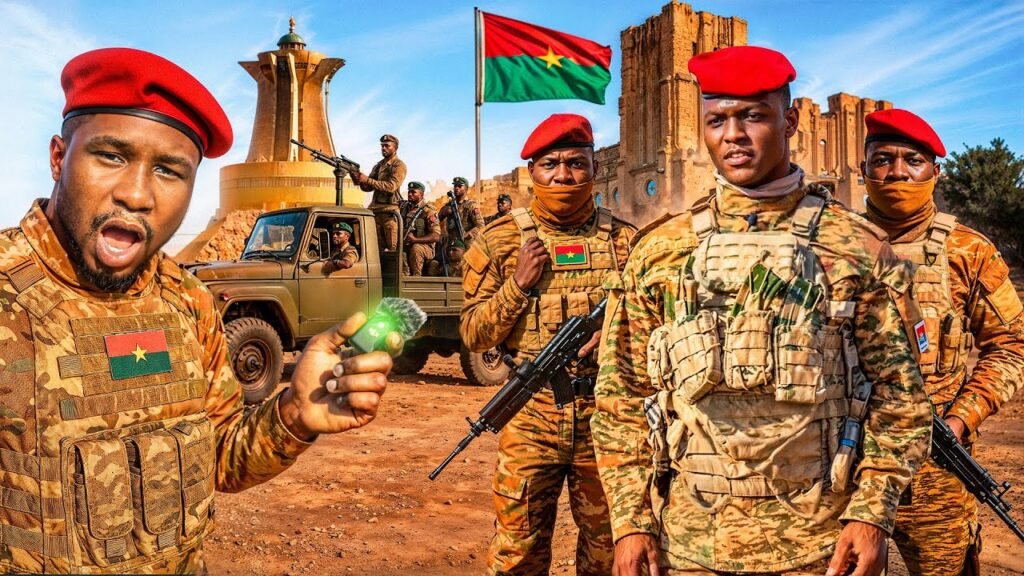
When I first heard that a relative had relocated to Burkina Faso in search of greener pastures, I was shocked.
Burkina Faso? The country I mostly knew from headlines about terrorism, military coups, and instability?
It didn’t make sense until I looked closer. What I found is a story more layered, more controversial, and more symbolic of Africa’s future battle for sovereignty than I ever expected. And at the center of it all? A 34-year-old military captain turned revolutionary leader: Ibrahim Traoré.
Who Is Ibrahim Traoré (And Why Is the West Nervous)?
In 2022, Captain Ibrahim Traoré seized power in Burkina Faso’s second coup in under a year. He didn’t come in as a polished politician. He came as a young soldier with big ideas and an even bigger promise:
“No more politics. Only progress.”
Traoré is now Africa’s youngest head of state and arguably its most controversial. He’s expelled French troops, suspended Western media, rejected IMF loans, and started buying back his country’s gold mines from foreign companies, not through force, but through actual payment.
But it hasn’t come without backlash. According to reports, there have been over 18 assassination attempts on his life; via poison, snipers, even undercover agents. It’s no wonder some of his supporters now sleep on the streets, pledging to defend him with their lives.
Why Burkina Faso Matters Right Now
Burkina Faso is resource-rich, from gold and iron to lithium and cobalt, yet it remains one of the poorest countries in the world. The math doesn’t add up unless you factor in neo-colonial systems, foreign control of mining rights, and decades of dependency on aid and international loans.
Traoré’s message is clear:
“We want our wealth back. And we’ll build our country ourselves.”
6 Radical Changes Traoré Has Made (So Far)
1. Expelled French Forces & Media
French troops were given 30 days to leave. News outlets like France 24 and RFI were suspended. In his words, this was a “second independence.”
2. Rejected IMF Loans & Foreign Aid
Instead, he’s criticized the West for funding ineffective NGOs and locking African countries into debt cycles that don’t build true prosperity.
3. Cut Foreign Contracts for Infrastructure
Airports, roads, and public works once built by outsiders are now managed by local Burkinabé workers, with Traoré purchasing over 1,000 machines to enable them.
4. Boosted Local Agriculture and Food Processing
To ensure food security and reduce dependence on imports.
5. Reclaimed Control Over Energy
He’s pushing for state-run electricity and energy systems to limit foreign monopolies.
6. Bought Back Major Gold Mines
In a historic move, his administration spent $80 million to purchase two gold mines, a symbolic and economic step toward sovereignty.
The Rise of the Sahel Alliance
Traoré’s Burkina Faso isn’t standing alone. Along with Mali and Niger, they’ve formed an alliance of Sahel states, cutting ties with ECOWAS, ditching the CFA franc, and discussing a new joint currency, passport system, and unified army.
This is more than politics. This is a continental shift. It’s a generation of African leaders saying:
“We are done being dictated to from Paris, Brussels, or Washington.”
But Is It Too Much Power in One Man’s Hands?
Supporters see Traoré as the reincarnation of Thomas Sankara, another young revolutionary who dreamed of self-reliance and died for it. Traoré has refused a salary, kept his rank as “Captain” instead of General, and relaunched Air Burkina and even an electric car prototype named “Sahel.”
But not everyone is cheering.
Critics point to real concerns:
- Suspended constitution
- No fixed election date
- Media restrictions
- Online censorship
- A growing military state where power flows from the barrel of a gun, not the ballot box
One major red flag? The creation of the VDP (Volunteers for the Defense of the Homeland), 50,000+ armed civilian fighters, many young and unemployed. Some see it as a necessary defense force, but others fear it’s turning Burkina Faso into a war economy.
So… Is This a Revolution or Another Repeat of History?
It’s hard to say. What’s happening in Burkina Faso feels historic, raw, and deeply emotional, but also uncertain.
We’ve seen this story before. Sankara was assassinated. Gaddafi was ousted. Promises turned to chaos. So now, the question on everyone’s mind, including mine, is this:
Will Traoré hand over power when the time comes?
Will Burkina Faso transition into a truly sovereign, democratic African nation, or will it become another cautionary tale of revolutionary power gone unchecked?
Final Thoughts
Burkina Faso is rewriting its story. Whether it becomes a blueprint for African self-determination or a battlefield of broken promises depends on what comes next.
But one thing is clear: Africa is watching.
The West is worried.
And the youth are awakening.
I’m packing my bags soon to visit Burkina Faso for myself, to hear firsthand what this new chapter feels like from the people living it.
Until then, I leave you with this question:
Can military rule ever truly lead to people’s freedom?
Let me know what you think.
Until the next journey,
— Steven Ndukwu
You can watch the full documentary here.
